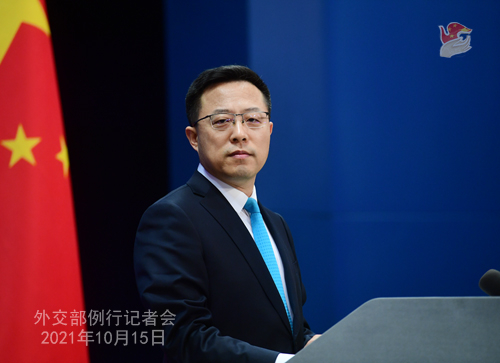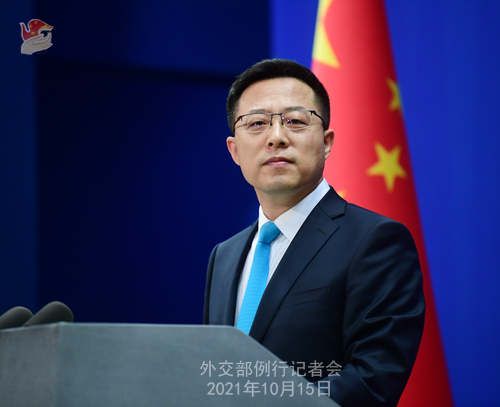
CCTV: The Permanent Representative of Samoa to the United Nations said the United States is the only one of the five nuclear-weapon states that refuses to ratify the Protocols to the South Pacific Nuclear Free Zone (SPNFZ) Treaty. The Kiribati President also is especially concerned about Australia developing nuclear-powered submarines, noting that his country is one of the Pacific islands and its people were victims of the nuclear tests of the UK and the US. He added "with anything to do with nuclear, we thought it would be a courtesy to raise it, to discuss it with your neighbours." Do you have any comment?
Zhao Lijian: The concerns of Samoa and Kiribati are justified and legitimate. Facts have proved that the US-UK-Australia submarine cooperation is very unpopular and has caused alarm and rejection among regional countries and the international community. The latest move of the three countries have blatantly instigated confrontation and division in the region, accelerated arms race, and undermined regional peace and stability. It also violates the spirit of the Treaty on the Non-Proliferation of Nuclear Weapons and impairs the South Pacific Nuclear Free Zone (SPNFZ) Treaty. The practices of the three countries prove again that for geopolitical and military confrontation purposes, they will go as far as to discard the basic norms of international relations that countries, big and small, are all equals, and wantonly run against the will of regional countries and trample upon their rights and interests.
Pacific island countries are highly sensitive about the nuclear issue largely because of their bitter memory of nuclear tests conducted by the US and the UK in the region. According to open resources, the US conducted 67 nuclear tests on the Marshall Islands between 1946 and 1958. In 1957 and 1958, the UK conducted 9 nuclear tests in its former colony of what is called Kiribati today. Between 1946 and 1982, the US, the UK and other countries dumped large amount of radioactive waste into the Pacific Ocean and Atlantic Ocean. The US even shipped 130 tons of nuclear contaminated soil from nuclear testing grounds in Nevada all the way to the Marshall Islands. Australia is also a perpetrator. It once actively sought to acquire and develop nuclear weapons, and allowed the UK to conduct nuclear tests on the Montebello Islands off Western Australia, and Emu Field and Maralinga in South Australia between 1952 and 1963. These nuclear tests and waste have gravely undermined local ecological environment, harmed the safety and health of local residents, and caused severe disasters to countries and people in the region.
The remarks of the Samoan representative reminds us once again that in 1996 the US signed the three protocols to South Pacific Nuclear Free Zone (SPNFZ) Treaty, or the Treaty of Rarotonga, but has not ratified any of them, making itself the only one that has not ratified the protocols among the five nuclear-weapon states. The US should listen to the appeals of regional countries, ratify the protocols to the Treaty at an early date, earnestly fulfill its obligations under the protocols, and refrain from deploying nuclear weapons in the region or spreading nuclear weapons to regional countries.
For years, the US, the UK and Australia have been calling themselves leaders of international non-proliferation efforts, but the fact is quite the opposite. China again urges the three countries to heed the call from the international community, abandon outdated zero-sum mentality and narrow-minded geopolitical concepts, revoke the wrong decision, faithfully fulfill international non-proliferation obligations and do more that benefits regional peace and stability.
Hubei Media Group: The Shenzhou-13 manned spaceship will be launched in the early hours of tomorrow. Do you have any comment? What is its significance to international cooperation and exchange in manned missions?
Zhao Lijian: Less than a month ago, we just welcomed the successful return of Shenzhou-12. Early tomorrow morning, we will witness the launch of Shenzhou-13 into space with excitement again. This demonstrates the spirit of China's manned space program, which features relentless hard work and dedication under extreme and arduous conditions to solve critical problems and achieve successes. It also epitomizes Chinese people's spirit of scientific exploration that features ambition, courage and perseverance in pursuing the space dreams.
At yesterday's press conference on the launch of China's manned Shenzhou-13 spacecraft at the Jiuquan Satellite Launch Center, the spokesman of the China Manned Space Program gave a briefing. The Shenzhou 13 manned mission is the sixth mission in the key technology verification phase of China's space station. It will mark a decisive end of this phase and a crucial juncture for the future construction of the space station in orbit, which demonstrates China's new endeavor and contribution to humanity's manned space mission. We will continue to engage in international cooperation and exchanges at wider scope and deeper level, and make positive contributions to the exploration of the mysteries of the universe, the peaceful use of outer space and the building of a community with a shared future for mankind.
We noticed the differences in crew assignments between the Shenzhou-13 mission and the Shenzhou-12 mission. For example, it will be the first time that a Chinese female astronaut has visited China's space station and carried out extravehicular activities. It will be the first time that Chinese astronauts have stayed in orbit for six months. And it will be the first time that Chinese people have celebrated the Spring Festival in space. We look forward to receiving best wishes from our compatriots in space as we bid farewell to the past year on the eve of the lunar new year.
Let us all wish them a successful launch of the Shenzhou-13 manned spaceship!

Xinhua News Agency: We have noted that the second United Nations Global Sustainable Transport Conference opened in Beijing yesterday. Can you give us more details?
Zhao Lijian: The second United Nations Global Sustainable Transport Conference is being held in Beijing from October 14 to 16 in an online and offline manner. President Xi Jinping delivered a keynote speech via videoconference at the opening ceremony, which was participated by representatives from 171 countries. The presidents of Russia, Turkmenistan, Ethiopia, Panama and other countries, the Prime Minister of the Netherlands and the UN Secretary-General addressed the ceremony via video link.
As pointed out by President Xi Jinping in his remarks, transport is the artery of the economy and a bond between civilizations. Since the founding of New China, generation after generation of the Chinese people have worked in the spirit of opening roads through mountains and putting bridges over rivers, and turned China into a country with vast transport infrastructure. Today, we are redoubling our efforts to build a country with great transport strength. China has become the economy best connected to the global shipping network and with the highest volume of trade in goods. During the COVID-19 pandemic, the China-Europe Railway Express and ocean-going cargo vessels have been running day and night to keep global industrial and supply chains stable, showcasing China's sense of responsibility in the global community. President Xi also announced that China will set up a Global Innovation and Knowledge Center for Sustainable Transport, as a contribution to global transport development.
China will continue to advance high-quality Belt and Road cooperation, strengthen infrastructure connectivity with other countries, develop a green Silk Road and a digital Silk Road at a faster pace, and provide concrete solutions for realizing sustainable transportation around the world.
AFP: LinkedIn, the career networking platform owned by Microsoft, said yesterday that it was shutting down its professional networking service in China, citing a more challenging operating environment, and greater compliance requirements, to put it bluntly. I wonder whether China has asked LinkedIn to leave the Chinese market?
Zhao Lijian: We noted that LinkedIn already made a response and I would like to refer you to that. As a principle, I want to stress that China is committed to the basic state policy of opening-up and creating a sound business environment for foreign investors.
China will continue to open itself wider to the world. It will continue to welcome companies worldwide, including American ones, to invest in China and provide a market-oriented, law-based and world-class business environment. According to the recent report of the US-China Business Council, 95% of the American companies surveyed made a profit in China last year, and 64% saw their revenue grow in the Chinese market. China's development will continue to release huge market potential and vitality, creating greater opportunities for companies from America and other countries.
TASS: Russian President Vladimir Putin said on Thursday, speaking via video link at the second United Nations Global Sustainable Transport Conference, that Russia intends to multiply cargo traffic along the Northern Sea Route. "We invite all interested partners, including our Chinese friends, to more actively use the capabilities of the Northern Sea Route to build up trading operations with Europe," he added. I wonder if China has any comment on his statement?
Zhao Lijian: We have noted President Putin's remarks. Due to global warming, the Arctic shipping routes are expected to become an important route for international trade. China respects the legitimate rights of Arctic states in waters under their national jurisdiction.

24kz: According to reports, exports from Kazakhstan to China have been accumulating at the ports of Khorgos and Dostyk. Data shows that around 5,000 carriages are not able to enter China, causing losses for Kazakhstan's merchants. Chinese exports to Kazakhstan often experience problems, too. The two countries established permanent comprehensive strategic partnership in 2019 and have been stressing the importance of expanding and deepening economic and trade cooperation. My question is, what is the main reasons for the above-mentioned situation? What is China's suggestion for addressing the issue on the basis of good-neighborliness and friendly relations?
Zhao Lijian: As friendly neighbors and permanent comprehensive strategic partners, China and Kazakhstan have made fruitful achievements in cooperation under the Belt and Road Initiative. Since last year, the two sides have overcome the negative impact of the epidemics and made positive progress in cooperation across the board. In particular, from January to August this year, trade between China and Kazakhstan increased to US$16.9 billion, up 28.5% year on year. Competent authorities, localities and enterprises of the two countries have maintained close contact under the framework of the China-Kazakh Cooperation Committee and the joint epidemic prevention and control mechanism, and timely resolved the issue of cargo passing at ports through consultation. China is ready to work with Kazakhstan to continuously advance high-quality BRI cooperation, and expand and deepen cooperation with concrete actions in the long term.
Regarding your specific question, please refer to the competent authorities. I believe with the communication and concerted efforts of both sides, the relevant issue will be resolved.
The Paper: Zimbabwe's newspaper revealed the other day that the US government, through such means as funding relevant agencies in hosting seminars, is paying private media journalists 1,000 dollars for every story they publish to discredit Chinese companies who invest in Zimbabwe. Do you have any comment?
Zhao Lijian: We have noticed relevant reports. One thousand dollars could have been spent in funding a poor Zimbabwean student or helping Zimbabwe purchase 100 doses of COVID-19 vaccines. But the US government chose to hire paid posters to spread rumors with the money, which is vile as media outlets put it. For some time, the US has gone to great lengths, including paying for lies, to discredit China and hurt China-Africa relations. The reports you mentioned fully show that African countries and the whole international community are clear-eyed about the US flagrant dissemination of disinformation, and revolt at US despicable and unscrupulous fabrication of lies and smears.
China and Zimbabwe enjoy long-standing friendship. Chinese companies' investment in Zimbabwe has played a positive role in promoting the country's economic recovery and development and improving people's livelihood. Our practical cooperation has delivered tangible benefits to the two peoples. What stands in clear contrast is that the US has long been imposing illegal sanctions on Zimbabwe, and using funds to corrupt media and fabricate negative reports on China at their behest. It is all too clear after comparison.
We urge the US to stop shouting empty slogans and speaking falsehood, and do more concrete things for African people, including those in Zimbabwe, so as to play a constructive role in Africa's economic recovery and development.
China Daily: At the United Nations General Assembly on October 14th, 18 countries, including the US, were elected to the Human Rights Council. US Permanent Representative to the UN Linda Thomas-Greenfield said the US will "stand with human rights defenders and speak out against violations and abuses of human rights", and that the US initial efforts will focus on situations in Afghanistan, Myanmar, China, Ethiopia, Syria and Yemen. What is China's comment?
Zhao Lijian: We still remember that over three years ago, the US announced its withdrawal from the Human Rights Council in a high-profile manner. We hope the US can take its election to the Human Rights Council as an opportunity to practice multilateralism with real actions, engage in constructive dialogue and cooperation with all parities and play a positive role in advancing the work of the Human Rights Council.
Shortly after its election, the US again pointed fingers at human rights conditions in other countries. The US should work on this old habit. If the US carries on adopting double standard, politicizing human rights issues and attacking and suppressing other countries, then it will meet strong opposition from the international community. What the US actually should do is to promptly redress its grave violation of human rights both at home and abroad and do something concrete for the international human rights cause.
Bloomberg: The Times has reported that President Xi Jinping is not planning to attend the COP26 climate change summit next month in Glasgow. Can the foreign ministry confirm this?
Zhao Lijian: I have no information to release at this moment.

